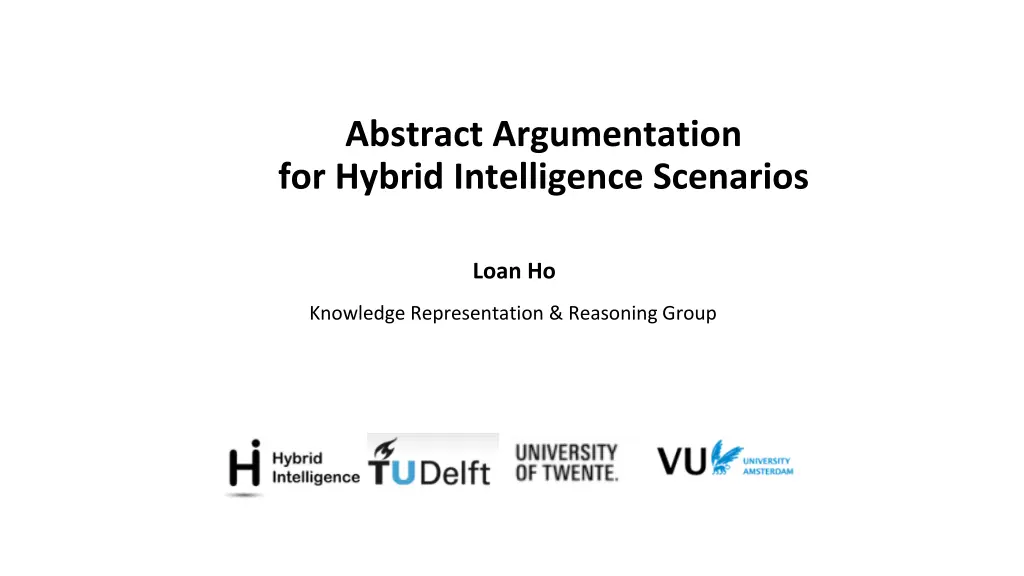
Abstract Argumentation for Hybrid Intelligence Scenarios
"Explore how abstract argumentation contributes to hybrid intelligence scenarios, combining human and artificial intelligence, with a focus on knowledge representation and reasoning. Discover research questions, explainability, and translation methods in the context of computational argumentation." (400 characters)
Download Presentation

Please find below an Image/Link to download the presentation.
The content on the website is provided AS IS for your information and personal use only. It may not be sold, licensed, or shared on other websites without obtaining consent from the author. If you encounter any issues during the download, it is possible that the publisher has removed the file from their server.
You are allowed to download the files provided on this website for personal or commercial use, subject to the condition that they are used lawfully. All files are the property of their respective owners.
The content on the website is provided AS IS for your information and personal use only. It may not be sold, licensed, or shared on other websites without obtaining consent from the author.
E N D
Presentation Transcript
Abstract Argumentation for Hybrid Intelligence Scenarios Loan Ho Knowledge Representation & Reasoning Group
Hybrid Intelligence (HI) According to the paper Akata et.al., Hybrid Intelligence (HI) systems which combine human and artificial intelligence and attempt to integrate human and machines rather than use AI to replace human intelligence. Hybrid Intelligence scenarios Recommender System User Question Answer +Explanation Feedback Return an answer
Research Questions RQ1. What are the capabilities of Argumentation in representing and reasoning knowledge of HI scenarios in the presence of inconsistencies? RQ2. How can Argumentation enable Explainability in HI scenarios?
XAI by computational argumentation Outputs Data/ Decisions Argumentation Framework Argumentation-based explanations
Translation of the HI scenarios into AF Mediate translation method Immediate translation method
Example - Project 09 Scenario: The agent schedules the meeting at 10am. Unfortunately, the manager got sick, and he will not be able to join the meeting. He cancels the meeting at 10am. => User wants to know why the meeting cancelled at 10am?
Abstract Argumentation Framework - Computational Argumentation Argumentation Framework (abstraction of debate) Argumentation Semantics (evaluation of debate) Properties (goodness of semantics) Is the meeting booked at 10am? NO e.g. preferred semantics A1: Tim books a meeting at 10am (set of winning arguments) A2: Tim doesnot books a meeting at 10am
Argumentation-based Explanation User: Why not bookMeeting(Tim,meetingA,10am)? System: Because cancelMeeting(Tim,meetingA,10am) User: I understand there is a reason why meeting A is not booked at 10am by Tim.
Survey Research Research Methodology Participants Materials and procedure
Survey Research - Research Methodology S1: We conduct a survey for HI project members and the survey were analyzed by using qualitative data analysis methods. Determine participants who are PhD candidates working on HI project members. Design survey questions. Conduct the survey by asking the participants for information through a questionnaire, which is online. S2: We investigate how Argumentation can assist in representing and reasoning inconsistent KBs of the scenarios and how Argumentation can support the vision of explainable AI. Translate KBs of HI scenarios to AF. Describe how Argumentation enables Explainability according to what they explain (i.e. providing explanations through Decision-Making, Justification of an opinion, and Dialogues).
Survey Research Participants Conduct a survey among 26 sub-projects of the HI. Five of the participants did not respond to our survey, which resulted in a final number of 21 contributing participants. Materials and procedure Conduct a survey by asking the participants for information through a questionnaire (in online). Conducted interviews (both online and face to face) focused on the projects that most clearly deal with inconsistencies.
Summary Result Clarify 14 out of 21 HI projects having scenarios with inconsistent information, and the reason of inconsistencies. For 10 out of the 14 projects, we analyzed how to apply Argumentation to model the specific representation knowledge. Categorize 14 projects based on the type of problems that Argumentation can address in their use-cases. We did not analyse the remaining projects since conflicting information is not available in their scenarios or the projects currently do not using data or knowledge.
Limitations We chose to focus on projects of the HI Centre. Data/ knowledge from these dialogues expressed in natural language or synthetic simple numeric data or documents => still challenge. Various projects having massive data in real-world application => the use of argumentation based explanation is still a challenge.
Conclusions We outline potential HI scenarios in different application domain. We demonstrate the capabilities of Argumentation in representation and reasoning inconsistent KB of HI scenarios. We show how Argumentation can enable Explainability in the HI systems, for solving various types of problems in decision-making, justification of an opinion, and dialogues.
Future Work Materialize human machine dialogue from human text dialogues in the HI scenarios. Causality could be achieved by reasoning over each step that led to a decision and explain why alternatives were left Argumentation and causality for this purpose. out => combine
Thank you for your attention! Feel free to ask questions
